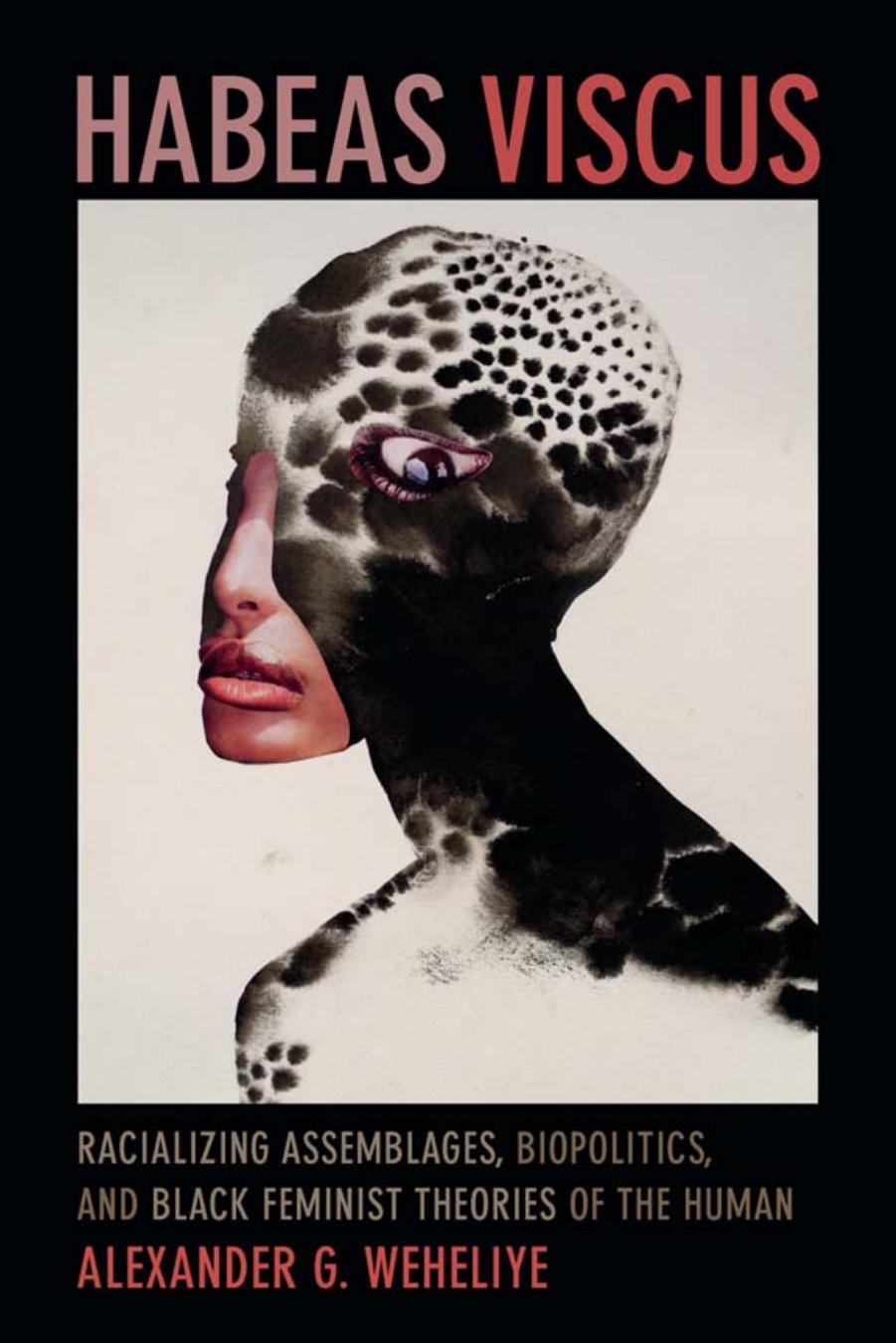Habeas Viscus: Racializing Assemblages, Biopolitics, and Black Feminist Theories of the Human by Alexander G. Weheliye

Author:Alexander G. Weheliye [Weheliye, Alexander G.]
Language: eng
Format: epub, pdf
ISBN: 9780822376491
Publisher: Duke University Press
Published: 2014-08-19T18:30:00+00:00
Habeas viscus: because to fully inhabit the flesh might lead to a different modality of existence.
7
DEPRIVATION: HUNGER
Where the first six chapters have for the most part inhabited the dominion of subjection, and chapter 6 set the stage for theorizing political violence in a different register, the remaining two chapters zero in on the equally important constructive dimensions of this topography. Put simply, they bring to the fore those transformative assemblages of the flesh that acknowledge the social life found in those bottomless circles and circles of sorrow around political violence. In contrast to bare life, biopolitics, and so on, habeas viscus incorporates the violent racializing assemblages that facilitate the continued conflation of Man with human while also pumping up the volume on the insurgent praxes of humanity composed in the hieroglyphics of the flesh. Besides trying to appreciate the creative politicopoetic contours of the flesh, I enter this territory with the following questions: How can C. L. R. James's hunger strike while he is detained on Ellis Island and the Muselmänner's apparitions of food teach us to mouth âI cravesâ in a tongue as of yet nonexistent in the world of Man? How might we read the scripture of the flesh, which abides among us âin every single approach to things,â but too often lingers in the passing quicksands of indecipherability, otherwise? What does hunger outside the world of Man feel like? Is it a different hunger, or just the same as the famines created by racializing assemblages that render the human isomorphic with Man? How do we describe the sweetness that reclines in the hunger for survival? How is the craving for life sweetened by the sugary textures, smells, and tastes of freedom? What tastes does âthe joy of being humanâ in and beyond âa land of freedomâ proffer?1 Will every cook finally be able to govern once we leave Man by the wayside? Can we practice an ontological politics that starves Man's fever but feeds the cold that will eventually spell his ruin?
In 1952 C. L. R. James was detainedâimprisoned as he insists on calling itâfor four months (JuneâSeptember) on Ellis Island by the U.S. Immigration and Naturalization Service (INS) in order to be deported. James had been in the United States since 1938 on a tourist visa and in 1948 the INS ordered that he be deported. The hearings for James's case took place over the next two years, during which James delivered a series of lectures about American literatureâin the hopes that this would sway the U.S. authorities to cease the deportation proceedingsâthat would later serve as the basis for his 1953 text, Mariners, Renegades, and Castaways: The Story of Herman Melville and the World We Live In, which uses Herman Melville's Moby-Dick to allegorize capitalism, totalitarianism, and the ascent of U.S. empire. James wrote and, with the help of friends, self-published Mariners while waiting for the state to repeal his order of deportation, and sent the book to all U.S. congresspersons and others who might speak on his behalf in the deportation proceedings.
Download
Habeas Viscus: Racializing Assemblages, Biopolitics, and Black Feminist Theories of the Human by Alexander G. Weheliye.pdf
This site does not store any files on its server. We only index and link to content provided by other sites. Please contact the content providers to delete copyright contents if any and email us, we'll remove relevant links or contents immediately.
The Rules Do Not Apply by Ariel Levy(4957)
On the Front Line with the Women Who Fight Back by Stacey Dooley(4870)
The Lonely City by Olivia Laing(4799)
Bluets by Maggie Nelson(4548)
The Confidence Code by Katty Kay(4251)
Three Women by Lisa Taddeo(3426)
Not a Diet Book by James Smith(3411)
Inferior by Angela Saini(3311)
Confessions of a Video Vixen by Karrine Steffans(3301)
A Woman Makes a Plan by Maye Musk(3251)
Pledged by Alexandra Robbins(3171)
Wild Words from Wild Women by Stephens Autumn(3150)
Nice Girls Don't Get the Corner Office by Lois P. Frankel(3043)
Brave by Rose McGowan(2818)
Women & Power by Mary Beard(2767)
Why I Am Not a Feminist by Jessa Crispin(2748)
The Girl in the Spider's Web: A Lisbeth Salander novel, continuing Stieg Larsson's Millennium Series by Lagercrantz David(2717)
The Clitoral Truth: The Secret World at Your Fingertips by Rebecca Chalker(2713)
I Who Have Never Known Men by Jacqueline Harpman(2631)
